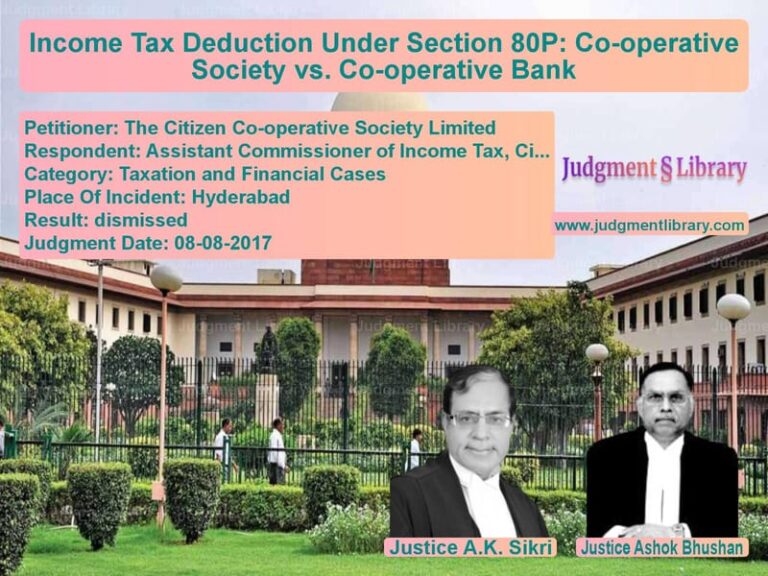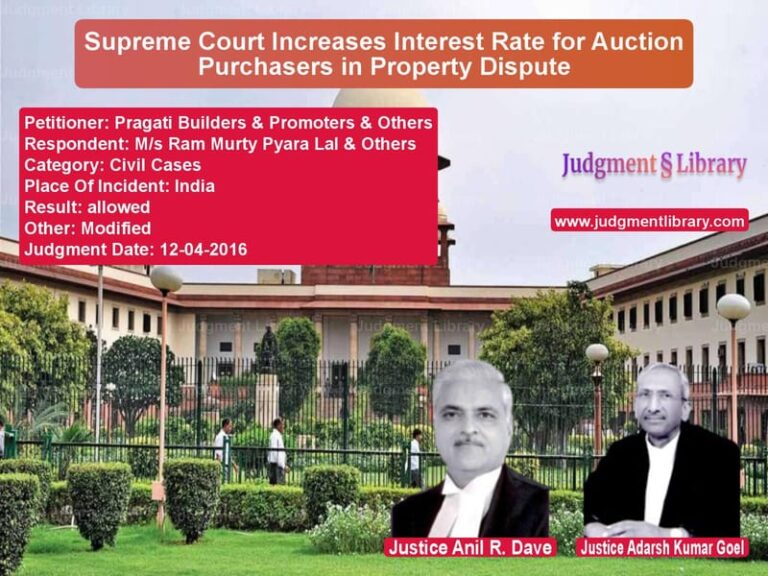Delayed Possession in Real Estate: Supreme Court Orders Refund with Interest in Homebuyer Case
The Supreme Court of India recently ruled on an important real estate dispute in the case of Kolkata West International City Pvt Ltd vs. Devasis Rudra. The case revolved around the prolonged delay in handing over possession of a residential unit to the homebuyer and the legal recourse available to buyers in similar situations.
The Court addressed key issues, including the enforceability of one-sided agreements favoring real estate developers and the right of homebuyers to seek a refund with reasonable interest if possession is delayed indefinitely. This landmark ruling underscores the importance of consumer protection in the real estate sector.
Background of the Case
The dispute arose when the appellant, Kolkata West International City Pvt Ltd (KWIC), failed to deliver possession of a Row House to the respondent, Devasis Rudra, despite multiple extensions of the promised completion date.
The sequence of events was as follows:
- The respondent booked a Row House in a project developed by KWIC and paid ₹39,29,280 in 2006 as per the letter of allotment dated 20 September 2006.
- A Buyer’s Agreement was executed on 2 July 2007, wherein the developer agreed to hand over possession by 31 December 2008, with an additional grace period until 30 June 2009.
- Despite waiting for years, the respondent did not receive possession. Consequently, he filed a consumer complaint before the West Bengal State Consumer Disputes Redressal Commission (SCDRC) in 2011.
- The complaint sought either the possession of the Row House or a full refund with 12% interest, along with ₹20 lakh in compensation for the delay.
Decisions of the Consumer Forums
The SCDRC ruled in favor of the homebuyer, ordering the developer to refund the entire amount along with 12% interest per annum and an additional ₹5 lakh in compensation. KWIC appealed this decision before the National Consumer Disputes Redressal Commission (NCDRC), which modified the compensation amount, reducing it from ₹5 lakh to ₹2 lakh while upholding the refund with 12% interest.
KWIC then challenged this order in the Supreme Court, arguing that the homebuyer had initially sought possession and that the company had since obtained a completion certificate, making possession possible.
Petitioner’s Arguments
The appellant, KWIC, presented the following arguments before the Supreme Court:
- The Buyer’s Agreement required the homebuyer to accept possession rather than seek a refund, as possession was now available.
- The company had obtained a completion certificate on 29 March 2016 and notified the respondent on 11 April 2016 about possession.
- The consumer complaint was initially filed seeking possession, which indicated that the buyer had not intended to exit the contract.
- In another consumer complaint filed by an association of 161 homebuyers, a settlement was reached with the NCDRC where possession was accepted along with 6% interest, which should be applicable to this case as well.
Respondent’s Arguments
The homebuyer, Devasis Rudra, argued the following:
- Despite being willing to accept possession when filing the consumer complaint in 2011, the excessive delay of nearly seven years made possession an unreasonable option.
- The letter dated 22 March 2016 from the developer offering possession was conditional and did not assure actual delivery.
- The Buyer’s Agreement contained unfair clauses, including an interest rate of only the savings bank rate (around 4%) for delays by the developer, while homebuyers were required to pay 18% interest if they defaulted.
- The claim for refund with 12% interest was justified, considering the economic losses suffered due to the delay.
Supreme Court’s Observations
The Supreme Court, led by Justices D.Y. Chandrachud and Hemant Gupta, analyzed the case thoroughly and made the following key observations:
“A buyer can be expected to wait for possession for a reasonable period. A period of seven years is beyond what is reasonable. Hence, it would have been manifestly unfair to non-suit the buyer merely on the basis of the first prayer in the reliefs sought before the SCDRC.”
On the one-sided nature of the agreement, the Court noted:
“The agreement was evidently one-sided. For a default on the part of the buyer, interest at the rate of 18% was liable to be charged. However, a default on the part of the developer in handing over possession would make him liable to pay interest only at the savings bank rate prescribed by the SBI.”
The Court further stated that homebuyers should not be forced to wait indefinitely for possession, and developers cannot bind them to unfavorable terms under the guise of contract law.
Final Judgment
The Supreme Court ruled as follows:
- The orders of the SCDRC and the NCDRC directing a refund of the amount paid by the homebuyer were upheld.
- The interest rate was modified from 12% to 9% per annum, considering fairness and economic conditions.
- The balance amount from the deposited sum would be refunded to the developer after settling the buyer’s dues.
The Court concluded:
“The Buyer’s Agreement will not preclude the right and remedy available to the buyer to claim reasonable interest or, as the case may be, compensation.”
Implications of the Verdict
This landmark ruling has several significant implications for the real estate sector and homebuyers:
- Consumer Rights Strengthened: Homebuyers now have a stronger legal standing to seek refunds when there are excessive delays in possession.
- Fairness in Contracts: The judgment sets a precedent for reviewing one-sided agreements that unfairly benefit developers at the expense of homebuyers.
- Legal Protection Against Delays: Developers can no longer indefinitely delay possession and expect homebuyers to remain bound by the contract.
- Interest Rate Standardization: The Court’s decision to modify the interest rate from 12% to 9% provides a balanced approach in such disputes.
By reinforcing the principle of fairness and consumer protection, the Supreme Court has provided a vital precedent for resolving similar real estate disputes in the future.
Petitioner Name: Kolkata West International City Pvt Ltd.Respondent Name: Devasis Rudra.Judgment By: Justice D.Y. Chandrachud, Justice Hemant Gupta.Place Of Incident: West Bengal, India.Judgment Date: 25-03-2019.
Don’t miss out on the full details! Download the complete judgment in PDF format below and gain valuable insights instantly!
Download Judgment: Kolkata West Interna vs Devasis Rudra Supreme Court of India Judgment Dated 25-03-2019.pdf
Direct Downlaod Judgment: Direct downlaod this Judgment
See all petitions in Consumer Rights
See all petitions in Damages and Compensation
See all petitions in Contract Disputes
See all petitions in Judgment by Dhananjaya Y Chandrachud
See all petitions in Judgment by Hemant Gupta
See all petitions in partially allowed
See all petitions in Modified
See all petitions in supreme court of India judgments March 2019
See all petitions in 2019 judgments
See all posts in Civil Cases Category
See all allowed petitions in Civil Cases Category
See all Dismissed petitions in Civil Cases Category
See all partially allowed petitions in Civil Cases Category







